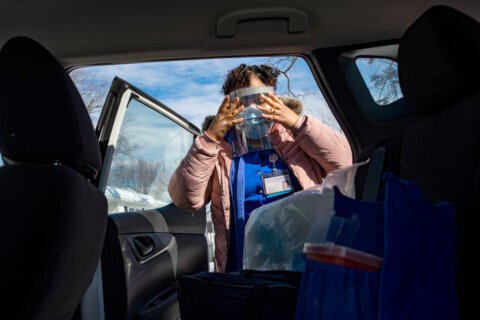WASHINGTON — A blind Arlington woman is taking Uber to court after she says a driver refused to give her a ride because she had a service dog.
On June 15, 2015, 29-year-old Tiffany Jolliff and her guide dog, an 8-year-old golden lab named “Railey,” needed a ride home to Pentagon City after having dinner in Crystal City. The federal worker took out her smartphone and called for an UberX car using the Uber app. Minutes after requesting a ride, a car pulled up and the driver rolled down her window to speak with Jolliff.
Jolliff said the driver, after noticing the dog, asked her if “that dog” was going too. When Jollif said the dog would be coming, she claims the drivers refused to allow her into the car.
“She said, ‘No I won’t take that, I can’t take that dog, I will not have that dog in my car,'” Jolliff said, recalling what she claims the driver told her.
Jolliff said she told the driver that it was illegal to refuse to complete the ride because she has a service animal. When Jolliff went to open the car door, she says the driver drove off, dragging her and her dog with the vehicle until she released her grip from the door handle.
Jolliff said she then called Arlington police and was taken to the hospital to be treated for a shoulder injury from the incident.
According to the Americans with Disabilities Act, and Uber’s rules, drivers are required to make accommodations for individuals with service animals.
“We were disappointed to learn of this rider’s experience as we are committed to increasing transportation options everywhere for everyone,” Uber said in a statement to WTOP. “We expect drivers to comply with our Code of Conduct that explicitly states service animals must be accommodated in compliance with accessibility laws.”
Jolliff’s attorney, Peter Romer-Friedman, said she is also asking for an unspecified amount of damages in the case which was filed in federal district court in the Eastern District of Virginia.
“It really is at the end of the day, Uber’s obligation to ensure that the law if followed, not to just respond just when there is a problem,” Romer-Friedman said.
According to Jolliff, being turned down by someone working with a ride sharing app is something she and other visually impaired people deal with frequently.
“I really worry that it’s going to get to the point where someone gets killed because the driver doesn’t want to accommodate someone with a service animal,” Jolliff said.








